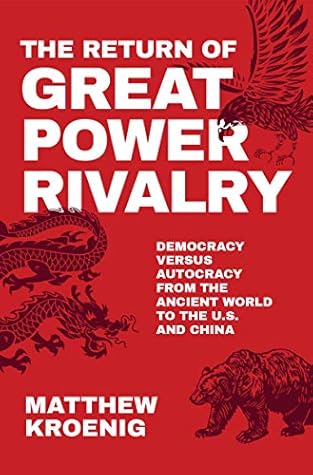More on this book
Kindle Notes & Highlights
Read between
July 13 - July 20, 2022
Washington maintains over fifty formal allies in Europe, Asia, and Latin America.
Revisionist autocratic powers considering aggression should be deterred by the prospect of fighting the entire free world at the same time.
Even though White House messaging is inconsistent, the rest of the U.S. government has taken concrete steps to strengthen U.S. alliances on the ground.
Until Russia and China have the ability to fight a full-scale war in North America, talk of genuine multipolarity is premature.
While rebuilding governments has proved to be an insurmountable challenge, the Pentagon has shown that it can topple them with relative ease.
China is certainly expanding its military capabilities, but it takes time (often a decade or more) to build major military platforms. Even if Xi Jinping makes the decision to do so today, it would take China until 2050 at the earliest to become a global military superpower.
Unlike its autocratic foes, U.S. leaders do not worry that the American system of government might fall tomorrow. As a result, they do not need to spend exorbitant amounts on domestic security.
Afghanistan left something to be desired. Yet, consistent with democracies in the past, America’s mistakes have been fewer and easier to rectify. Occupying Iraq and Afghanistan is not invading Russia in the winter.
Russia and China’s ability to contest the United States and its allies in Russia and China’s near abroad is growing, and this is a cause for concern. But this challenge must be put in perspective. U.S. military strategy is difficult today precisely because America is so powerful. The new military flashpoints have been pushed all the way to our adversary’s sovereign borders, so it is no surprise that they may have an edge.
The U.S. stake in the conflict would be nothing less than defending the U.S.-led international system. If it lost a war to Russia or China, then one could kiss that system goodbye. While Russia and China would be fighting to carve out a sphere of influence over a small state on their borders, Washington would be fighting for everything it has built over the past seventy-five years.
Social scientists might ask if the argument of this book is “falsifiable.” In other words, how would we know if it is wrong? The answer is simple. The argument of this book will be proven wrong if the United States is surpassed as the clear global leader by an autocratic country, such as China. To accomplish this feat, China would need to come to possess more global economic and military power than the United States, be in a position to set the rules that govern the international system, and sustain this position for an enduring period of time.


